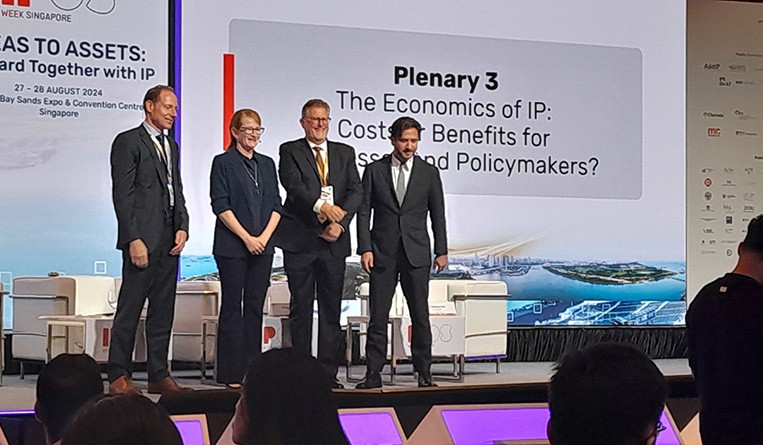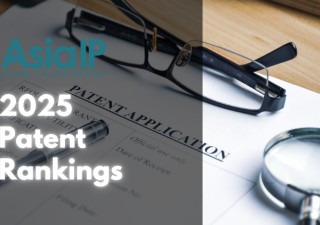IP Week @ SG: Innovation data and analytics can influence leadership decisions, impact growth
03 September 2024

(From left) Carsten Fink, Wendi Backler, Andrew Toole and Michael Falk at the panel session “The Economics of IP: Costs or Benefits for Businesses and Policymakers” during IP Week @ SG 2024
Innovation data and data analytics generate key insights that can help business leaders and policy-makers in making smart decisions that will impact organizational growth and help promote economic advancement.
In the last 10 years, global patent applications have reached 3.5 million while trademark filings have reached the 15 million mark as of 2022. According to United States Patent and Trademarks Office (USPTO) chief economist Andrew Toole, among the eight artificial intelligence (AI) sub-technology areas, machine learning is the one that is experiencing tremendous growth. This positive development is not happening merely in the U.S. Japan and China are also increasing their patenting activities for machine learning with USPTO. Toole was one of the speakers at the panel session “The Economics of IP: Costs or Benefits for Businesses and Policymakers” during IP Week @ SG 2024 held at the Marina Bay Sands Expo and Convention Centre in Singapore from August 27 to 28, 2024.
With the Covid-19 pandemic, digitalization efforts increased, and adoption of mobile apps and other digital systems has intensified. These developments have resulted in a huge body of data about IP-related initiatives from around the world.
Such innovation data may be harnessed by business enterprises and governments.
Wendi Backler, partner and director at global management consultancy firm Boston Consulting Group in Toronto, said that data and analytics are core to the company’s DNA. “We would never think of making a recommendation to any of our clients without it being very fact-based and grounded in data,” she pointed out.
Speaking at the same panel session as Toole, Backler shared the work done by Boston Consulting for one of their clients, a player in the biobanking industry. For this client, the Boston Consulting team discovered unexpected opportunities in adjacent growth spaces. One of these was the cryogenic tissue sample for biobanking space. Backler said they found out that the client can be competitively advantaged in this area in the future. “So we went back to our innovation data, our innovation analytics, to help identify who they should partner with, where they should invest, etc. We used patents, scientific research and collaboration data to help us figure out and prioritize where they should make investments. And then the final thing we did was we were able to identify for them a very strong path to building a solid IP foundation,” shared Backler.
The client has since made several acquisitions, has been generating hundreds of millions of dollars annually and doubled its total shareholder return to 22 percent. The company has since become a leader in the biobanking industry as well. “So I think in this case, innovation data and IP were really critical for corporate decisions about where and how to grow, how to diversify and what would be the sources of competitive advantage they need to actually win in this new and nascent market space,” said Backler.
She also cited Boston Consulting’s work with the Aviation Climate Taskforce (ACT), a non-profit coalition of major players in the aviation and airline industry whose aim is to de-carbonize aviation. ACT dedicates itself to fostering innovation networks to accelerate technology breakthroughs in sustainable aviation fields. “They’re heavily relying on innovation data and sophisticated analytics to achieve this,” Backler said. “We worked with them to map several very specific technology areas and identify links between researchers, institutions, companies, startups and so on and start to be able to identify where are the opportunities to close some of the gaps that exist as well as where to invest in some of the promising new technologies,” she revealed.
“I think in both these examples, innovation data and sophisticated analytics can really produce results that can be critical for leadership decision-making,” stressed Backler.
However, it is not as easy as merely collecting data and diving into a voluminous body of information to discover possibilities and new opportunities. According to Toole, data is huge, like an ocean, and diverse. “Unless you actually know what your objective is, you’re gonna be out there in the middle of the water not knowing which direction to swim. So the data is only useful if you have a particular location you’re trying to go and objective you’re trying to reach,” he reminded. “If I gave you 15 million patent documents and said ‘Hey what’s important about those documents?’ you might spend days, years and come back with something and I said, ‘Wait a minute, that’s not what I was asking. I wanted to know what are the top companies patenting in AI. I gave you 15 million patent documents to figure that out.’”
Backler agreed with Toole, adding it is also critical for the business enterprise or government to understand why it is headed in the direction it wants to go. She explained: “Somebody might tell you, ‘We need to know the demand for electric vehicles.’ I think that behind that question is ‘What are the drivers, what can disrupt that, what should we do about that, what are competitors thinking?’”
Also with Toole and Backler at the panel session was Michael Falk, chief economist at IP Australia. Carsten Fink, World Intellectual Property Organization (WIPO) chief economist, served as moderator.
- Espie Angelica A. de Leon, reporting from Singapore






